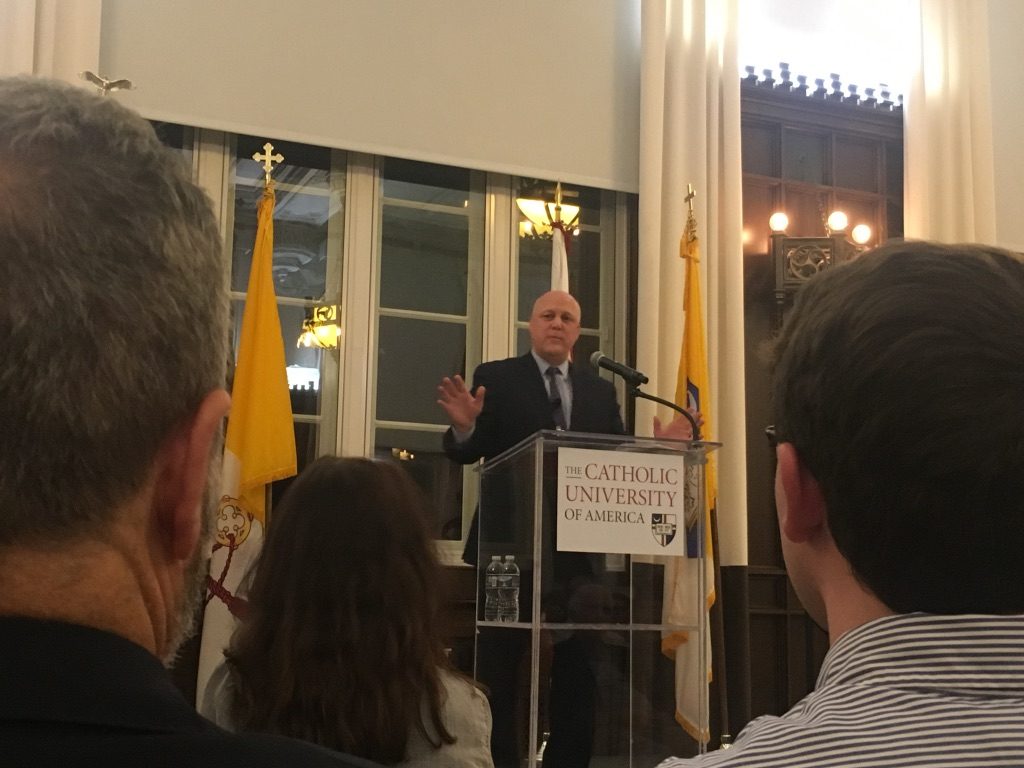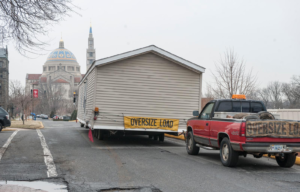Alumni, Mitch Landrieu Delivered a Speech Reflecting on his Book “In the Shadows of Statues”

Courtesy of Abby Anderko.

By Abby Anderko
Mitch Landrieu, the former Mayor of New Orleans spoke to the Catholic University community on Wednesday November 7 about his book In the Shadows of Statues: A White Southerner Confronts History in his presentation that is the newest installment in the History Matters lecture series. Other topics in the lecture included racism and supremacy issues that are still prevalent in our nation today.
The History Matters lecture series brings to light different modern topics that connect to historical events, to show the negative and positive impacts that history has. This lecture series is intended to demonstrate how knowing about the past and the present can help to move in the right direction in the future. Throughout the Fall of 2018, the university’s history department has been sponsoring these events.
Prior to becoming a politician, Landrieu was a student at Catholic University and received a degree in Political Science and Theater. As a student and young adult, Landrieu believed his calling was to be a professional actor; however, life took a different direction according to Landrieu, causing him to attend law school at Loyola University New Orleans. With his law degree, Landrieu worked in state legislature for about 16 years before moving into the Lieutenant Governorship of Louisiana in 2004. During his term as Lieutenant Governor, Louisiana was ransacked by Hurricane Katrina and has been rebuilding ever since.
In his lecture, he recounted the beginning of his first term as mayor of New Orleans working towards its reconstruction after the devastation of Hurricane Katrina. When working on reconstruction, he stated that the consensus was not to rebuild New Orleans as it previously was, but as it should have been. According to Landrieu, in order to build the city in the image of what it should be, the people of New Orleans were forced to face their history, their past, filled with the horrors of slavery and the repercussions of the Confederacy and the Civil War.
“Race in the south, particularly, is an issue that we have never really dealt with,” Landrieu said. “There has to be a reconciliation, and there can’t be a reconciliation without recognition.”
For Landrieu, recognition in New Orleans came in the form of taking down four monuments to Confederate leaders and events during the reconstruction. These statues of Robert E. Lee, Jefferson Davis, PGT Beauregard, and the Battle of Liberty Place obelisk were taken down in the spring of 2017 after immense deliberation and conflict from people throughout the city. Landrieu’s decision brought national attention to his speech given about the statues removal, causing the video to go viral. The popularity of his speech and the support he received about his perspective on this topic prompted him to write his book In the Shadows of Statues: A White Southerner Confronts History to address where he came from and the statues’ significance in American history.
His decision to take down the statues stemmed not only from the idea that they were morally wrong, but because they were erected to “send a message to African Americans notwithstanding the fact that slavery was over,” Landrieu said. He said “that they were still less than (others in the community) and that they could not occupy their rightful place in American government.”
Critics of Landrieu’s decision stated that the statues were there in remembrance of the city’s history, but Landrieu argued the difference between reverence and remembrance, with Louisiana having to reconcile with her past. The main criticism that he faced was with people saying that he was trying to erase history, except, Landrieu stated, he was not erasing history but confronting it. One of his final points in his lecture was that it is very hard for Americans to say simple truths, especially when referring to the Confederacy and slavery, but in admitting our faults we are made stronger.
College Democrats, a co-sponsor of the event, had a heavy presence there. College Democrats President Marie Erickson was especially excited about the event, having previously read Landrieu’s book.
“He did such a good job of explaining his thought process and his rationale for removing the statues,” Erickson said, “but then also capturing that it is such a small step in a very, very long journey to come in combating racism.”
When asked why Landrieu was chosen to speak in this lecture series, Professor Steven West of the department of history stated that he had read Landrieu’s speech and book and since he was an alum, thought he would be a great addition to the lecture series. West stressed the idea from the lecture of “out of many, one,” and the importance of being “honest of who we are and what the history of this country is.”
The next and final installment in the History Matters Lecture Series will be a panel discussion on immigration debates both past and present, on December 5.







